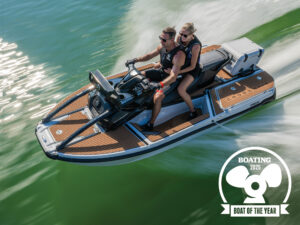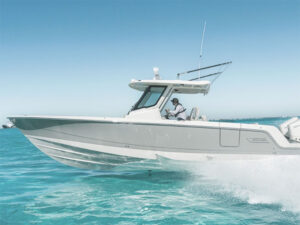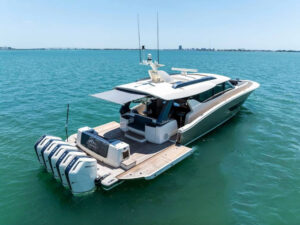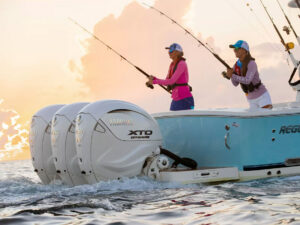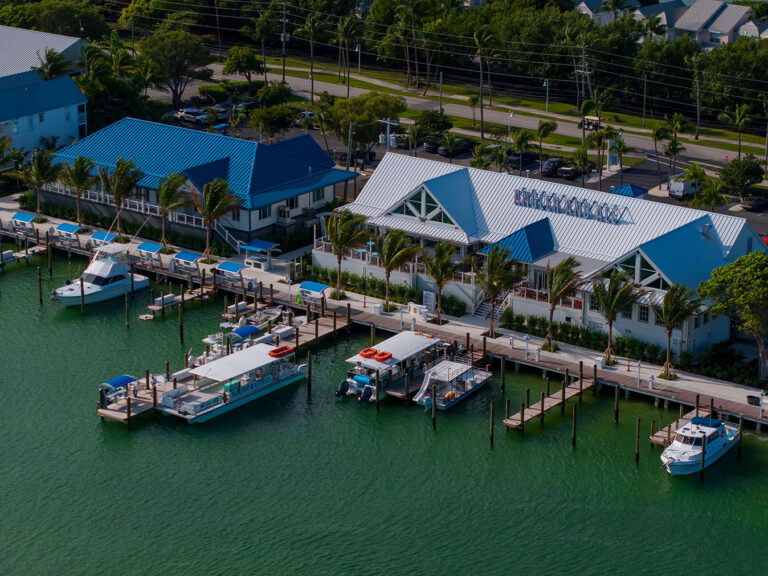Overview
Boasting a pedigree that includes multiple speed records, the Velocity 260 Bay hull features a deep, chop-busting V at the bow, a stepped transom to limit bow rise, and a pad bottom to generate lift and reduce fuel consumption.

Engine
Clearing the no-wake zone, we slammed the throttle forward, and the 260 smoothly leapt onto plane, a Mercury 350 Verado outboard with lab-finished prop continuing to pour on the coal till the boat peaked at 65.9 mph. Dropping the trim a few notches and cranking the wheel at speed, we came about in knifelike fashion. Later, the term knife came to mind again as the hull sliced efficiently through the waves, reverse chines knocking down the spray while the 260 Bay produced a solid, quiet ride.

Interior and Accessories
When it comes time to chase fish, the hull’s minimal draft, coupled with a standard Bob’s Machine Shop jack plate, enables the 260 Bay to hunt the flats. Three insulated fish boxes are at the ready to store your catch, two on the aft casting platform, and one larger, in-sole box with macerator forward. Livewells are placed both fore and aft. Rod lockers, as well as a large stowage box, hide below the 6-foot-long casting deck at the bow. Rod racks are under each gunwale.
There are two choices for helm seating: our test boat’s beefy, aluminum-tubed leaning post with flip-up bolsters, or a fiberglass-enclosed alternative. The former features two tackle drawers, the latter an enclosed tackle station.

The nicely faceted helm includes flat surfaces for two displays; on our test boat, the standard 9-inch -Mercury VesselView flat screen was paired with an optional Simrad GO9. Notably, jack-plate control is blinker-style behind the wheel. A standard Ritchie compass is stylishly integrated into the design.

A pair of flip-up jump seats are concealed beneath the aft platform, when passengers need a perch. A nicely padded seat with high backrest sits atop the RTIC cooler mounted in front of the console. Optional removable cushions can be added atop the forward deck.
How We Tested
- Engine: Mercury 350 hp Verado 350
- Drive/Prop: Outboard/Mercury Fury 4 14.5″ x 24″ 4-blade stainless steel
- Gear Ratio: 1.75:1 Fuel Load: 68 gal. Crew Weight: 360 lb.
High Points
- All parts, from the hull and deck to smaller components, are made with vacuum infusion or vacuum bagging for an advantageous strength-to-weight ratio.
- Gemlux friction hinges eliminate the need for gas hatch struts, and hinge stops guarantee hatches won’t mar the adjoining fiberglass.
- No raw painted glass here; all compartments are nicely finished off in gelcoat.
- JL Audio sound system includes an amplifier and Simrad interface.
Low Points
- Leaning post and cooler seat could benefit from additional handholds, especially given the aggressive nature of the hull.
- Tiny storage compartment drain holes seem destined to plug with gunk.
- Prototype test boat porpoised a bit at high speed. Velocity says it will take steps to eliminate the glitch in production models.
Toughest Competitor
Pathfinder’s 2600 HPS (starting at $105,120 with a 350 hp Yamaha outboard) likewise mixes go-fast speed, fishability and skinny-water ability.
Pricing and Specs
| Price: | $123,560 (with Mercury 350 Verado) |
|---|---|
| LOA: | 26’0″ |
| Beam: | 8’1″ |
| Draft (max): | 1’2″ |
| Displacement: | 2,350 lb. |
| Bridge Clearance: | 5’1″ |
| Fuel Capacity: | 80 gal. |
| Max Horsepower: | 350 |
| Available Power: | Single outboards to 350 hp |
Speed, Efficiency, Operation

Velocity Powerboats – Sanford, Florida; 386-679-5682; velocityboats.com

